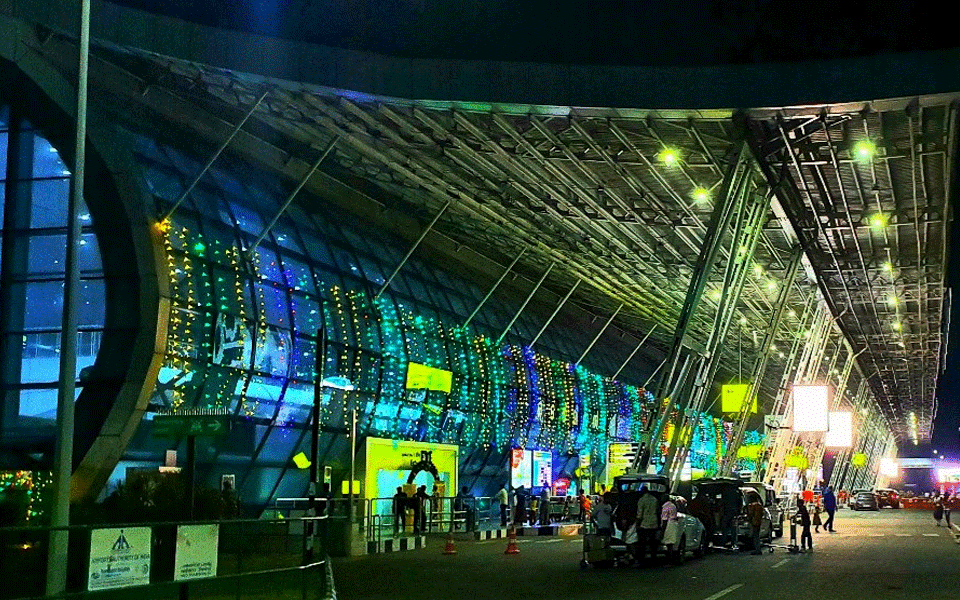Thiruvananthapuram (PTI): The Thiruvananthapuram international airport here is once again ready to close its runway and halt flight operations for five hours on Tuesday afternoon to enable the smooth passage of the "God".
The airport has been stopping operations and rescheduling flights twice in every year for decades to enable the bi-annual centuries-old ceremonial procession of the famous Padmanabha Swamy temple here to pass through the runway.
As one of the "Aaratu" processions of the temple, marking the culmination of the Alpassi festival, falls on Tuesday, the airport authorities here informed that the flight services shall remain suspended for five hours from 4.00 pm to 9.00 pm.
The practice of closing the airport for the ritualistic procession has been continuing without any fail even after the Adani Group took over its management last year.
"To enable and facilitate smooth continuation of a centuries-old ritual by Sree Padmanabhaswamy temple for the Alpassi Arattu procession, through the runway of the Thiruvananthapuram International airport, the flight services shall remain suspended from 1600 to 2100 hours on the 1st November, 2022," the airport management said here in a statement.
Domestic and international services during this period have been rescheduled.
An airport source said that at least 10 flights have been rescheduled for the ritualist procession as of now.
"There is an Aaratu mandapam near the runway where the temple idols are being kept for some time as part of the ritual during the procession. We are keeping it with all sanctity. We are facilitating the passage of the traditional procession. The flight companies are also extending all cooperation to retain the legacy," the source told PTI.
Historian Malayinkeezhu Gopalakrishnan said the mandapam, which is now located near the airport runway, is known as "karikku" (tender coconut) mandapam.
"The practice of keeping the idols for some time at this structure began during the reign of erstwhile king Anizham Thirunal Marthanda Varma in the 18th century. It was said that there was a practice to offer tender coconut for those who take part in the procession at the mandapam. That might be the reason the structure was named like that," he told PTI.
The procession would further proceed after some brief pujas and rituals.
According to the traditional practice, the processional idols of the temple deities would be carried to the sea behind the airport for a holy dip twice a year in a ceremonial march, which has been taking this route even before the airport was established in 1932.
The airport issues a NOTAM (Notice to Airmen) twice every year before the runway is closed during the bi-annual Alpashy festival which falls in October-November and the Panguni festival in March-April.
After a dip in the sea off Shankumugham beach, the idols would be taken back to the shrine in a procession lit by traditional torches which marks the conclusion of the festival.
Let the Truth be known. If you read VB and like VB, please be a VB Supporter and Help us deliver the Truth to one and all.
Bengaluru: Officials of the Karnataka Transport Department have uncovered an alleged tax evasion case involving a luxury Lamborghini Huracan Evo in Bengaluru. The evasion was carried out with forged documents which were allegedly used to evade over ₹37 lakh in road tax and penalties, officials said on Monday.
According to a report published by The Indian Express, an anonymous email was received by the transport department on December 12, 2025, which alleged that using fabricated documents, H1 Car Care had fraudulently registered the high-end vehicle at the Kasturinagar Regional Transport Office (RTO). The additional commissioner (Enforcement) ordered an inquiry after photographs of the allegedly forged paperwork, attached to the email were examined.
A police complaint was filed by Senior Motor Vehicle Inspector Ranjith N at the Kodigehalli police station. The complaint noted that the Lamborghini, bearing registration number KA-03-NX-0016, was originally purchased by Harsha Infra Cons Pvt Ltd from a Lavelle Road showroom on June 1, 2022, for ₹3,00,68,729.
The vehicle was temporarily registered at the Electronics City RTO from June 2 to July 1, 2022. Later the company sought permission to register it at a Regional Transport Office in Hyderabad, Telangana.
Investigators discovered that the accused had allegedly created fraudulent documents. He stated that H1 Car Care purchased the same vehicle in September 2025, about three years after it was sold and registered to Harsha Infra Cons. The alleged purchase price was shown as ₹3,00,58,729.
An official quoted by TIE said that the forged documents reused the same invoice number that had originally been issued to the first buyer, which is illegal. Investigators called an authorized Lamborghini dealer during verifications, who confirmed that the vehicle was sold to Harsha Infra Cons. The dealer further claimed that the invoice dated September 1, 2025, was reportedly issued to H1 Car Care, however it was never generated by the showroom and seemed to be faked.
After reviewing the paperwork, the Kasturinagar RTO determined that the fake papers were utilized to achieve the illegal registration. Officials informed that the vehicle was also undervalued to evade road tax and penalties amounting to over ₹37 lakh accumulated over the three-year period.
Following confirmation of the forgery, senior transport officials ordered the immediate seizure of the vehicle. The Lamborghini was traced on February 7 and seized from Sahakarnagar, where it was found linked to premises associated with H1 Car Care.





